[Mek◊ng Sci-Fi] :'บ่มีวันจาก' มุมมองหญิงในโลกสมมุติ ผี ความผูกพัน และความรุนแรงทางเพศในลาว
[Mek◊ng Sci-Fi] :'บ่มีวันจาก' มุมมองหญิงในโลกสมมุติ ผี ความผูกพัน และความรุนแรงทางเพศในลาว
18 ก.ย. 2567
SHARE WITH:
18 ก.ย. 2567
18 ก.ย. 2567
SHARE WITH:
SHARE WITH:
[Mek◊ng Sci-Fi] :'บ่มีวันจาก' มุมมองหญิงในโลกสมมุติ ผี ความผูกพัน และความรุนแรงทางเพศในลาว
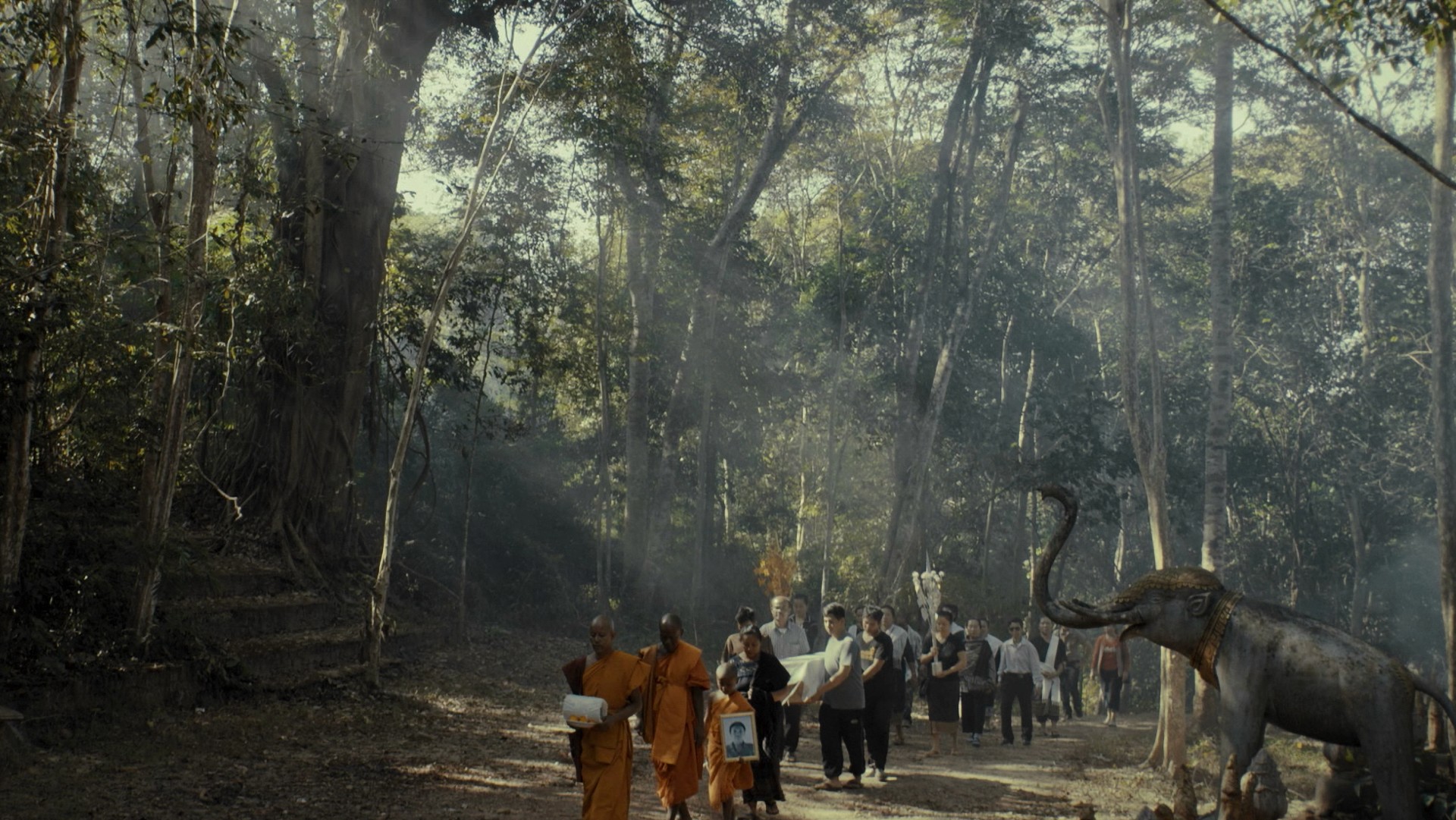


“บ่มีวันจาก เป็นผลงานที่มีเสน่ห์เฉพาะตัว ผสมผสานวิธีแบบนิยายวิทยาศาสตร์เข้ากับความเชื่อทางจิตวิญญาณที่ฝังรากลึกของชาวลาวได้อย่างลุ่มลึก เกิดเป็นภาพยนตร์ที่ทั้งหลอนและกระตุ้นความคิด”
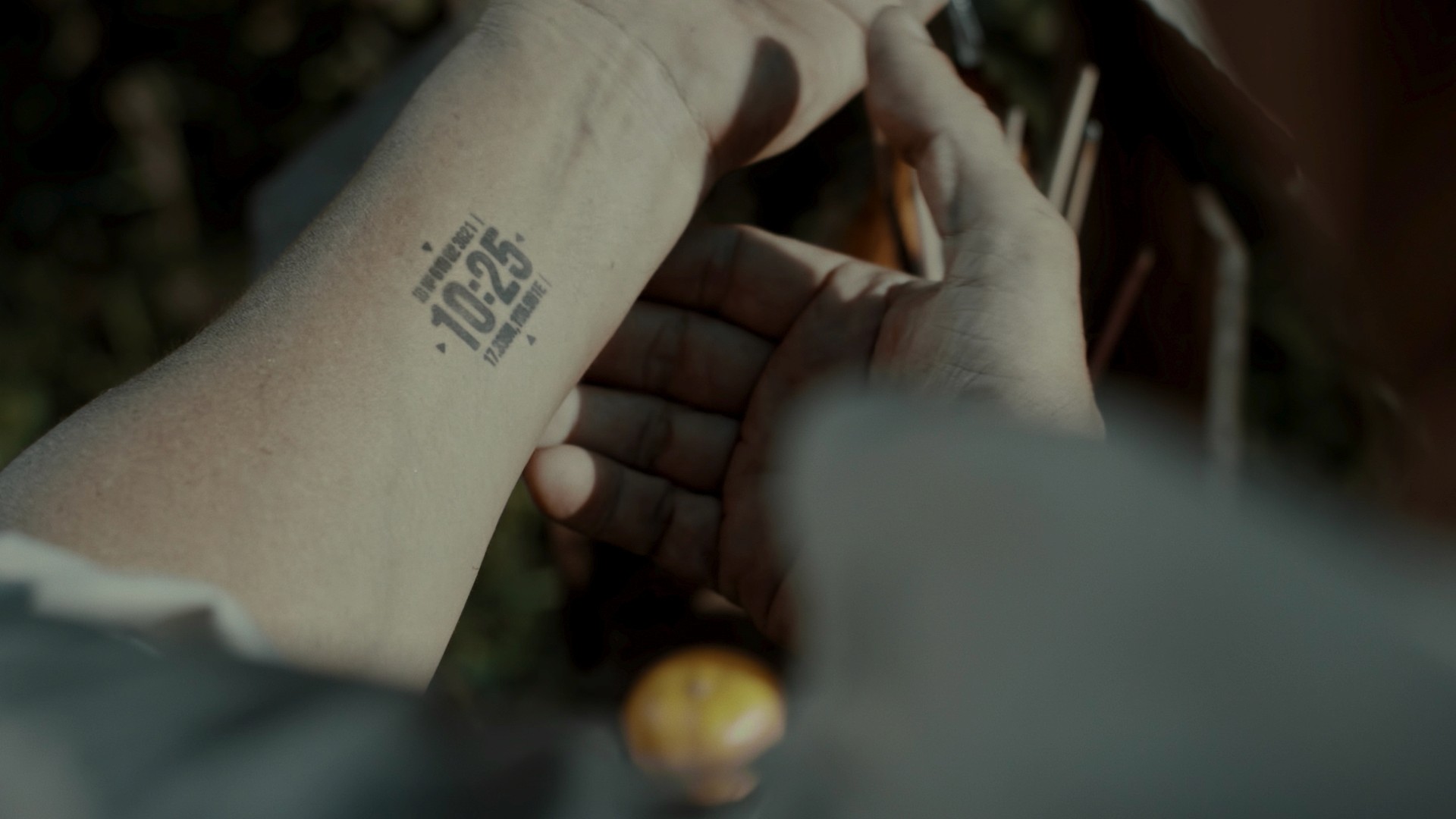
"ผมได้ชมภาพยนตร์เรื่องนี้ในช่วงเวลาที่สอดคล้องกับชีวิตอย่างลึกซึ้ง เมื่อผมสูญเสียคุณลุงพร้อมกันถึงสองคน"
ทั้งสองท่านจากไปด้วยโรคมะเร็ง ในเวลาห่างกันแค่ 1 วัน จากทั้งครอบครัวฝั่งพ่อและฝั่งแม่ เมื่อมองย้อนไปในสิบปีที่ผ่านมา ผมสูญเสียสมาชิกในครอบครัวไปแล้วถึงหกคน โดยคุณแม่จากไปเป็นคนแรก เรื่องราวนี้จึงสอดคล้องอย่างน่าประหลาดกับ บ่มีวันจาก ที่พาผู้ชมสำรวจความคิดถึงคนึงหาผู้ล่วงลับและการปล่อยวางผ่านโลกทัศน์แบบพุทธเถรวาทได้อย่างเจ็บปวด
“แล้วพุทธเถรวาทคือ?”— คุณอาจมีคำถาม
พุทธเถรวาทเป็นรูปแบบดั้งเดิมที่สุดของพุทธศาสนา และยังคงมีอิทธิพลอย่างสูงในแถบเอเชียตะวันออกเฉียงใต้ โดยเฉพาะดินแดนลุ่มแม่น้ำโขงตอนล่างอย่าง ลาว กัมพูชา เมียนมาร์ และ ไทย แม้จะไม่เป็นที่รู้จักในโลกตะวันตกเท่าพุทธมหายานหรือตันตรยาน แต่หลักธรรมของพุทธเถรวาทเกี่ยวกับความไม่เที่ยง ความทุกข์ การดับทุกข์ จิตใจมนุษย์ และกรรม ถูกถ่ายทอดอย่างลึกซึ้งในภาพยนตร์เรื่องนี้โดย 'แมตตี้ โด'
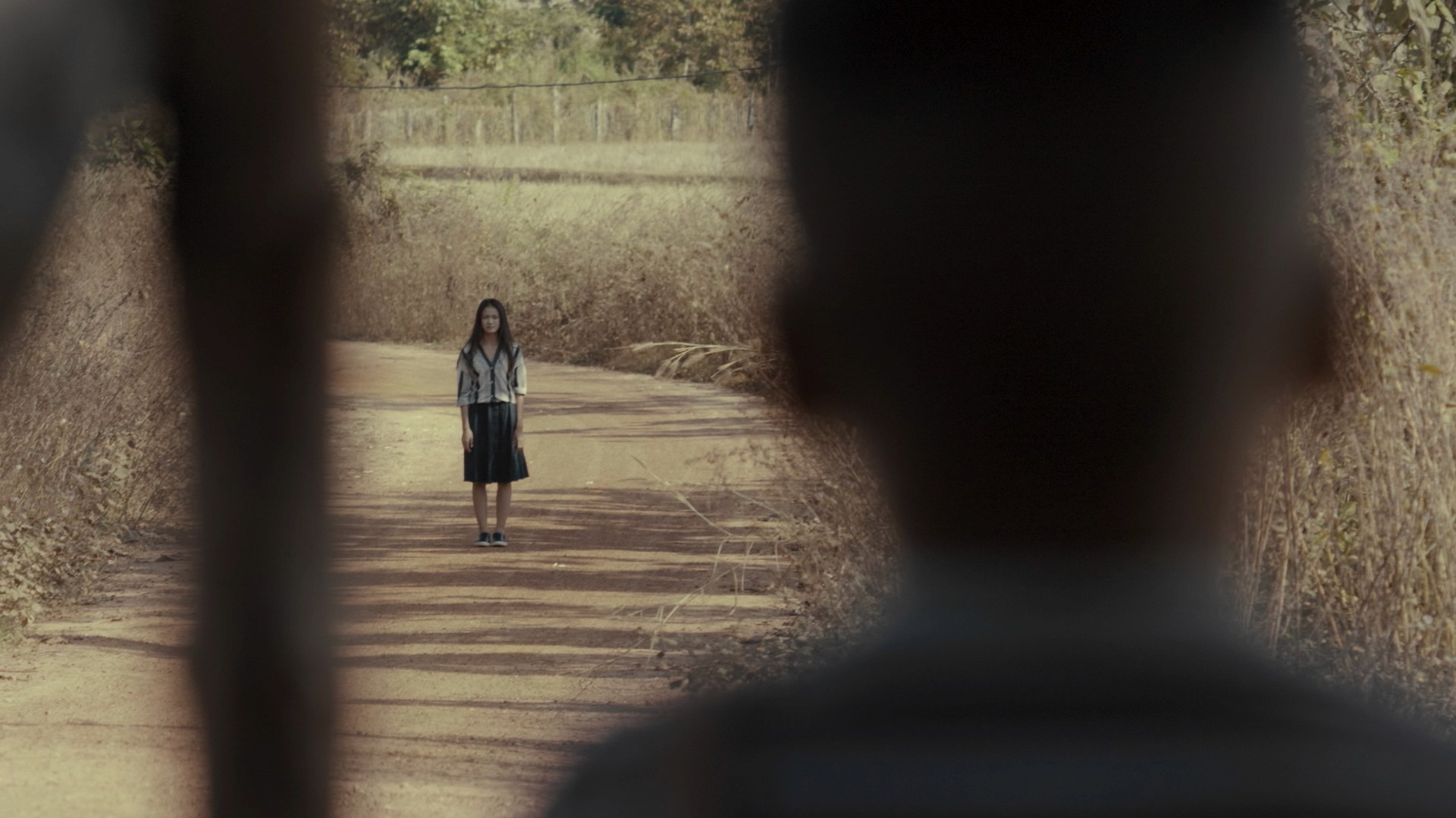
'แมตตี้ โด' เป็นผู้กำกับภาพยนตร์หญิงคนแรกและคนเดียวของลาว ที่มีชื่อเสียงจากผลงานหนังสยองขวัญ เธอเกิดและเติบโตในอเมริกาหลังครอบครัวอพยพไปช่วงสงครามกลางเมืองลาวเมื่อปี 1959-1975(2502-2518) แม้เส้นทางชีวิตของเธอจะพลิกผันจากนักเต้นบัลเล่ต์สู่การเป็นผู้กำกับภาพยนตร์ แต่เธอก็ยังคงรักษาเสน่ห์และลีลาเฉพาะตัวผ่านการถ่ายทอดความละเมียดทางอารมณ์ไม่ต่างจากการ improvise ของนักเต้นระหว่างการแสดง
ภาพยนตร์ของเธอทั้งสามเรื่อง จันทะลี(2012), น้องฮัก(2016), และ บ่มีวันจาก(2019) ต่างเป็นภาพยนตร์ที่ “มีผี” ทั้งสิ้น เธอใช้ “โลกสมมุติที่มีเงื่อนไขเฉพาะ” หรือ “speculative fiction” ผสานกับแนวทางแบบสยองขวัญในการสำรวจชีวิตชาวลาว ผสานตัวตนในฐานะผู้สร้างภาพยนตร์เข้ากับความเป็นชาวลาวพลัดถิ่น เล่าเรื่องวัฒนธรรมลาวผ่านโลกแฟนตาซี กลายเป็นความเฉพาะตัวในภาพยนตร์ลาว
เธอใช้สิ่งนี้ในการสำรวจชีวิตมนุษย์อันซับซ้อน ทั้งด้านจิตวิญญาณและเพศสภาพ แสดงให้เห็นจุดตัดของประเพณี ชีวิตปัจจุบัน และอนาคตของชาวลาว ส่งผลให้ บ่มีวันจาก เป็นแรงบันดาลใจทั้งในประเทศและระดับนานาชาติ
'บ่มีวันจาก' เล่าเรื่องชายชราในหมู่บ้านห่างไกลของลาวในอนาคต เขาสามารถเดินทางข้ามผ่านเวลาได้ด้วยความช่วยเหลือของวิญญาณหญิงสาว ที่เขาพบครั้งแรกเมื่อครึ่งศตวรรษที่แล้ว ตอนเป็นเด็ก เขาเจอเธอบาดเจ็บสาหัสในป่าพร้อมมอเตอร์ไซค์ที่คว่ำอยู่ เด็กน้อยอยู่เป็นเพื่อนเธอจนลมหายใจสุดท้าย จากนั้นวิญญาณของเธอกับเขาก็กลายเป็นเพื่อนกัน เหตุการณ์นี้เป็นจุดเริ่มต้นของความผูกพันชั่วชีวิต และการเดินทางข้ามเวลาเพื่อแก้ไขอดีตของเขา
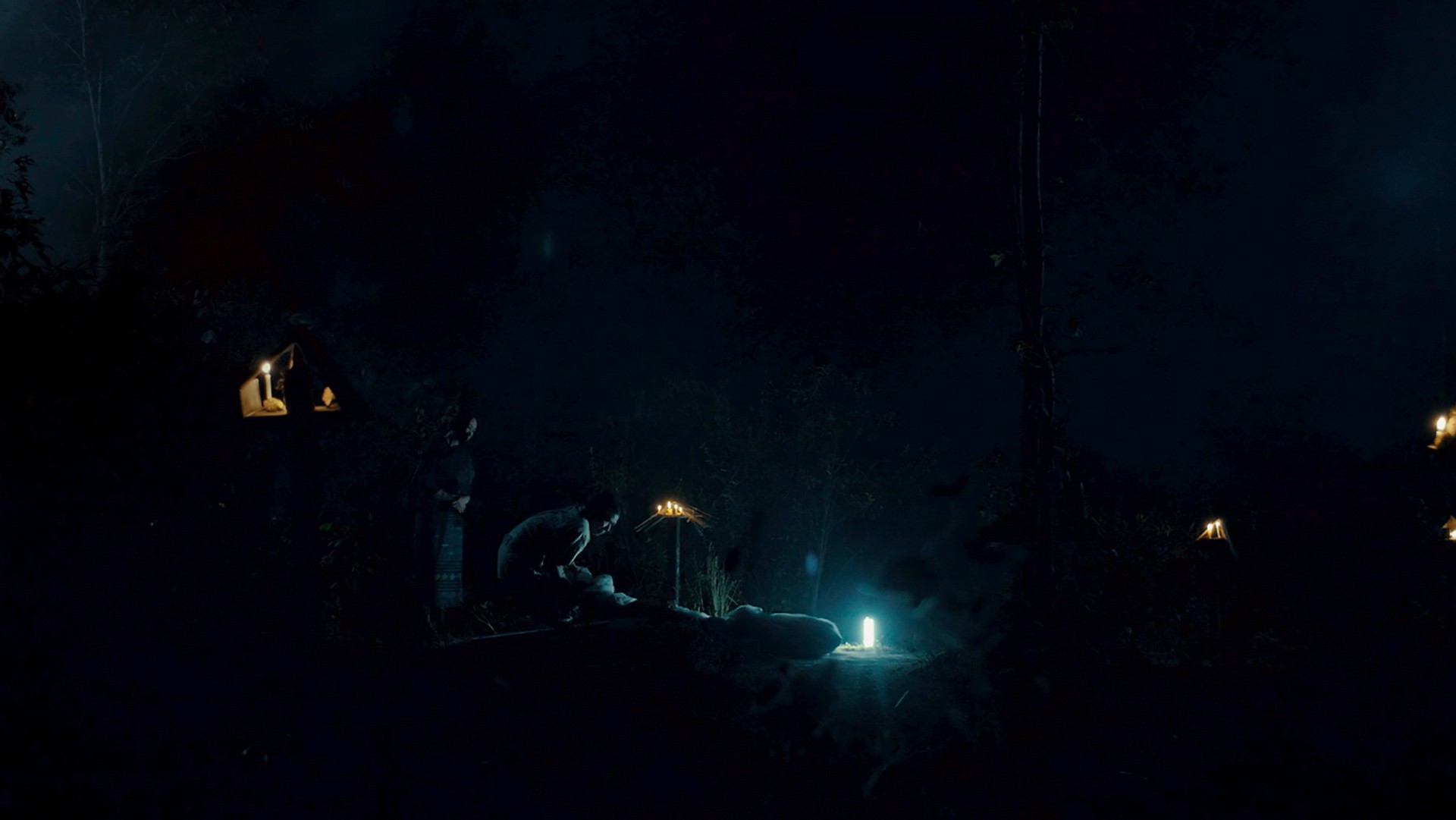
อย่างไรก็ตาม เมื่อเรื่องราวดำเนินไป สิ่งต่างๆกลับตาลปัตร ความหวังดีของเขากลายเป็นเชื้อร้าย ชายชรากลายเป็นฆาตกรต่อเนื่อง ทำการุณยฆาตให้เหล่าหญิงผู้ตรอมตรมโดยไม่ได้รับความยินยอม การกระทำนี้ไม่เพียงแสดงถึงความเมตตาที่บิดเบี้ยว แต่ยังสะท้อนรากเหง้าของความรุนแรงในเพศชาย(toxic masculinity) ภาพยนตร์วิพากษ์ปมอยากเป็นฮีโร่ของผู้ชาย ที่ต้องการเป็นผู้ปลดปล่อย(Messiah) ซึ่งมักนำไปสู่การทำร้ายมากกว่าช่วยเหลือจริงๆ
ตัวเอกเชื่อว่ากำลังช่วยเหลือผู้อื่นอย่างมีมนุษยธรรม แต่แท้จริงเขาแค่ตอบสนองปมในใจที่ต้องการแก้ไขเหตุการณ์ก่อนแม่เสียชีวิต การกระทำของเขาคือผลพวงของความรุนแรงที่สืบทอดมาจากพ่อ — ชายผู้ล้มเหลวและไร้ความสามารถในการเป็นผู้นำครอบครัวและทิ้งครอบครัวไป การบ่มเพาะจากความรุนแรงที่เกี่ยวพันกับบทบาททางเพศนี้ เพิ่มความซับซ้อนให้กับเรื่องราวอย่างมาก และทำให้เขากลายเป็นทั้งเหยื่อและผู้กระทำในเวลาเดียวกัน
อาการหลงผิดของตัวเอกถูกเน้นย้ำด้วยการสะสมกระดูกนิ้วมือของเหยื่อ สะท้อนถึงปมการ "ยึดติด" อย่างรุนแรง การกระทำนี้คล้ายกับเรื่องของ องคุลิมาล ในพระไตรปิฎก ผู้สะสมนิ้วมือของเหยื่อเพื่อยืนยันความเก่งกล้าของเขา แม้ท้ายที่สุดองคุลิมาลจะได้รับการเทศนาจากพระพุทธเจ้า จนกลับใจศึกษาพระธรรมจนบรรลุเป็นพระอรหันต์ หลุดพ้นจากสังสารวัฎ นับเป็นเหตุการณ์ครั้งสำคัญในพุทธประวัติที่มักถูกกล่าวถึงในเชิงสัญลักษณ์แห่งความเมตตาของพระพุทธเจ้าและการกลับใจของคนบาปเสมอมา อย่างไรก็ตาม ตัวเอกใน บ่มีวันจาก ยังคงยึดมั่นต่อการทำการุณยฆาตต่อไป ด้วยเชื่อมั่นว่าสิ่งที่เขากำลังทำนั้น นำพาวิญญานของเหยื่อไปสู่ความสงบที่แท้จริง ณ “สวนสุสาน” ของเขาที่ถูกสร้างไว้ราวกับเป็นยูโทเปียที่เต็มไปด้วยศาลพระภูมิและซากศพของผู้ที่ถูก “ปลดปล่อย”
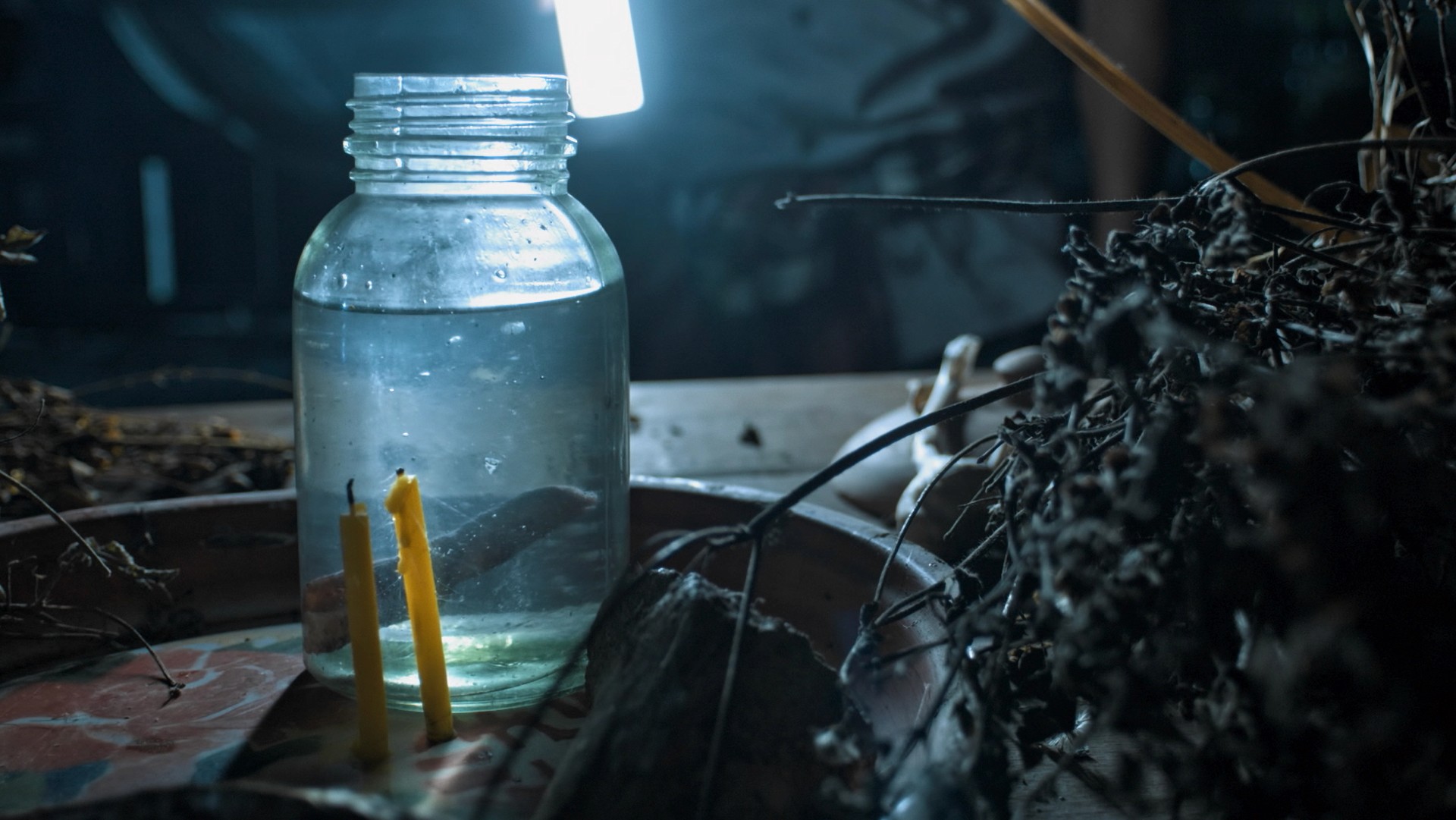
การมีอยู่ของวิญญาณในภาพยนตร์เรื่องนี้ ตอกย้ำถึงความเชื่อทางจิตวิญญาณที่มีมาอย่างยาวนานในภูมิภาคลุ่มน้ำโขงตอนล่าง อันเป็นพื้นที่สำคัญที่ได้รับอิทธิพลอารยธรรมอินเดียมาแต่โบราณทั้งทางวัฒนธรรมและศาสนา อย่างไรก็ตาม ความซับซ้อนของวัฒนธรรมในภูมิภาคนี้ไม่ใช่ผลผลิตของอิทธิพลอินเดียเพียงอย่างเดียว แต่ยังเป็นผลมาจากการพัฒนาของวัฒนธรรมท้องถิ่น และความเปลี่ยนแปลงที่เข้ามาพร้อมการค้า การแลกเปลี่ยนความรู้กับวัฒนธรรมอื่นๆ รวมถึงจีน ชาติเอเชียตะวันออกเฉียงใต้ และ ยุโรป ความเชื่อทางจิตวิญญาณและขนบธรรมเนียมประเพณีของที่นี่ ผสานการบูชาผี บูชาบรรพบุรุษ กับพุทธศาสนานิกายเถรวาท ซึ่งถูกอิมพอร์ทเข้ามาผ่านการค้าและการปฏิสัมพันธ์กับอินเดีย โดยได้รับอิทธิพลจากอาณาจักรขอม และศรีลังกาตามลำดับ
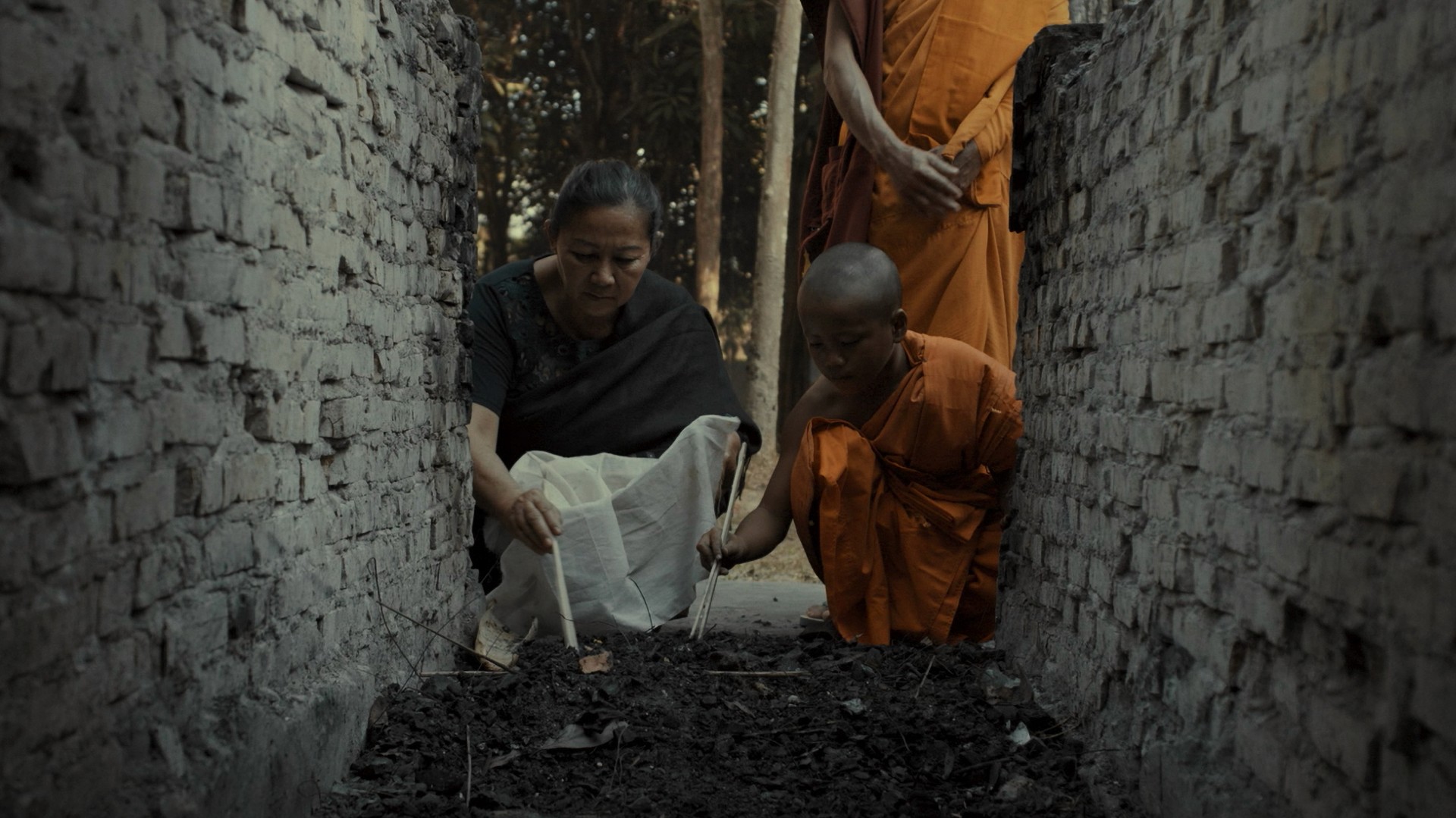
"ศาลพระภูมิ" เป็นตัวอย่างของการผสมผสานระหว่างการถือผีแบบดั้งเดิมกับพุทธศาสนา ใช้เป็นที่พำนักของวิญญาณและรับการเคารพบูชา สะท้อนวิธีที่ท้องถิ่นรับแนวคิดใหม่โดยไม่ทิ้งความเชื่อเดิม ศาลพระภูมิจึงเป็นตัวอย่างที่ชัดเจนของการผสมผสานทางศาสนาอย่างมีเอกลักษณ์ในภูมิภาคนี้
ในพุทธศาสนานิกายเถรวาท ซึ่งมีอิทธิพลมากในลาว กัมพูชา เมียนมาร์ และไทย แนวคิดเรื่องกรรมมีบทบาทสำคัญ หลักของกรรมกล่าวถึงกฎแห่งเหตุและผล การกระทำในชีวิตนี้หรือชาติก่อนเป็นตัวกำหนดอนาคต
การกระทำของชายชราใน บ่มีวันจาก สะท้อนหลักการนี้อย่างลึกซึ้ง แม้ว่าเขาดูเหมือนจะมีเจตนาดี แต่ที่สุดแล้วก็เป็นไปเพื่อการตอบสนองปมในใจตัวเอง ความยึดติดเกิดจากการไม่สามารถปล่อยวางความเจ็บปวดและความรู้สึกผิดต่อการเสียชีวิตของแม่เมื่อเขายังเด็กได้
การเดินทางข้ามเวลากลายเป็นเครื่องมือสำรวจแนวคิดเรื่องกรรมและผลของการกระทำ อันเป็นแก่นของพุทธเถรวาท ที่มองว่าความทุกข์เป็นส่วนหนึ่งของชีวิต และการพยายามสร้างผลดีด้วยกรรมชั่ว มักนำไปสู่ทุกข์ที่มากขึ้น ยิ่งตัวเอกพยายามเปลี่ยนแปลงอดีตเพื่อบรรเทาทุกข์ในใจ ก็ยิ่งรบกวนความเป็นไปของกรรม นำไปสู่เหตุการณ์ที่ซับซ้อนขึ้น นี่คือสาเหตุแห่งทุกข์ที่กักขังเขาในวังวนไม่สิ้นสุด ทำให้เขาเวียนว่ายตายเกิดโดยยังยึดติดกับความทุกข์จากครอบครัวที่ล้มเหลวมานับพันภพชาติแล้ว
'บ่มีวันจาก' ไม่ใช่แค่หนังผีธรรมดา แต่เป็นการสำรวจความซับซ้อนของความทุกข์ การปล่อยวาง และผลของการกระทำ การเล่าเรื่องที่ชาญฉลาดของ แมตตี้ โด ที่ใช้ผีเป็นเครื่องย้อนเวลา นำเสนอเรื่องราวที่ลึกซึ้งเกี่ยวกับการยอมรับความเป็นจริง และการยอมรับความตายของผู้เป็นที่รักเมื่อมันเดินทางมาถึง พร้อมๆกับบอกเราว่า อย่าไปยึดติดกับสิ่งที่ผ่านไปแล้วเลย
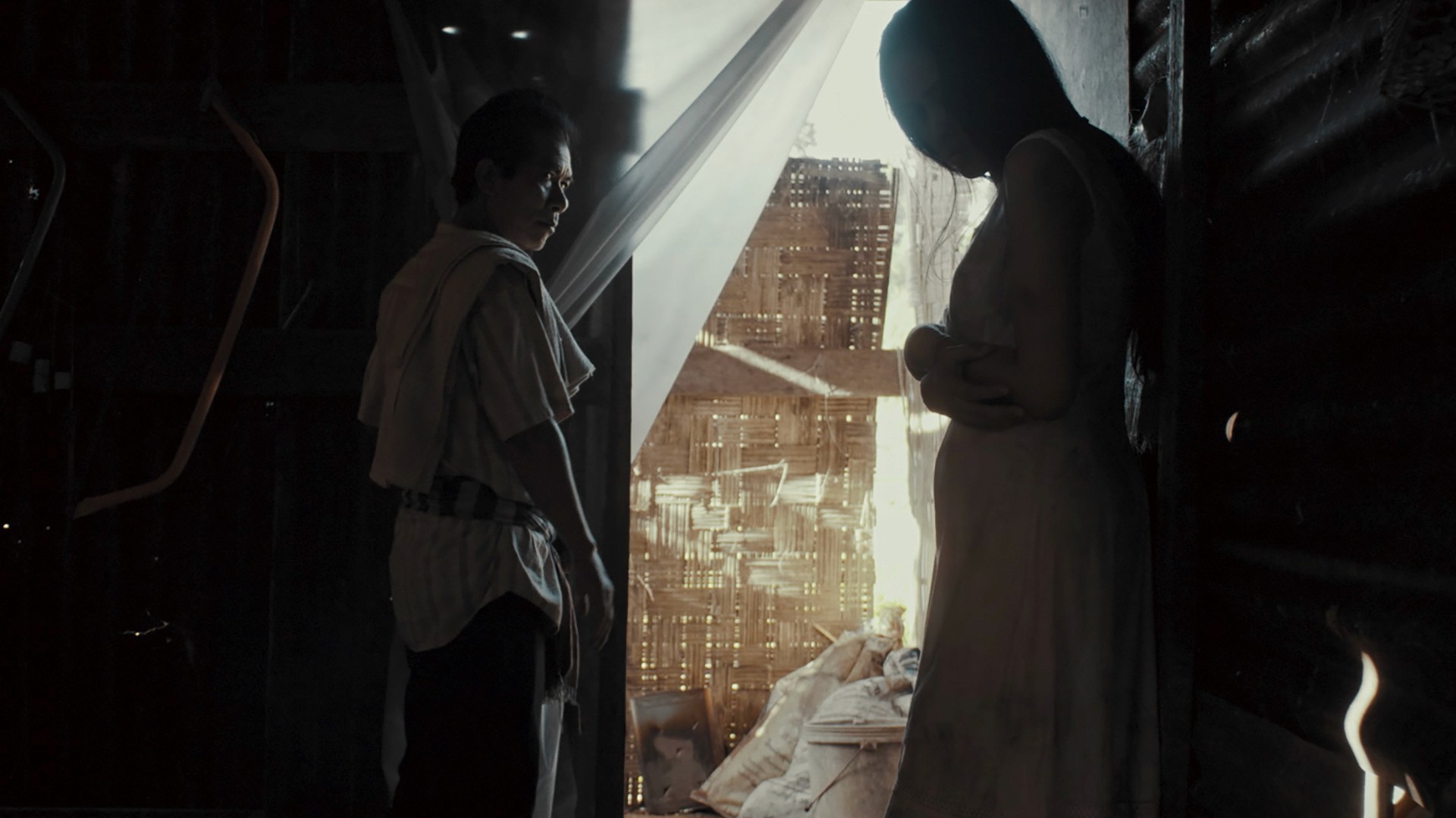
"บ่มีวันจาก จึงเป็นมากกว่าเรื่องราวที่อยู่ในภาพยนตร์ไซไฟที่เราเคยเห็นกัน"
ผลงานนี้นำเสนอการไตร่ตรองชีวิตมนุษย์ผ่านมุมมองทางจิตวิญญาณของวัฒนธรรมลาว โดยผสมผสานแนวคิดต่างๆเข้าด้วยกัน ได้แก่ ทั้งปรัชญาพุทธศาสนา ประเด็นความรุนแรงทางเพศ และแนวหนังหลากหลาย ทั้งไซไฟ สยองขวัญ และปรัชญาชีวิต นำเสนอผ่านตัวละครที่เผชิญกับปัญหาสำคัญ เช่น ความยึดติด ความรู้สึกผิด ความรุนแรงในสังคมที่มีต้นกำเนิดจากผู้ชาย วัฏจักรของชีวิต ความตาย และ ผลกรรม ผลงานนี้สามารถสื่อสารมุมมองที่มีเอกลักษณ์ของลาวอย่างมีความเป็นสากลให้ผู้ชมทั่วโลกสามารถเข้าถึงได้
บ่มีวันจาก ของ แมตตี้ โด เป็นประสบการณ์ทางภาพยนตร์ที่ไม่เหมือนใคร สะท้อนให้เห็นถึงอิทธิพลที่มีอยู่อย่างลึกซึ้งของอารยธรรมอินเดียในภูมิภาคเอเชียอาคเนย์ที่ปรากฎผ่านพุทธศาสนานิกายเถรวาท การใช้เรื่องราวเหนือธรรมชาติไม่เพียงเพื่อสร้างความบันเทิง แต่เพื่อเสนอความคิดที่ลึกซึ้งเกี่ยวกับจิตใจมนุษย์ ความปรารถนาลึกๆในการกลับไปเปลี่ยนแปลงอดีต และผลที่ตามมาของความพยายามเหล่านั้น รวมไปถึงปัญหาความรุนแรงในครอบครัว ที่กลายเป็นบาดแผลในจิตใจของตัวละครเอก
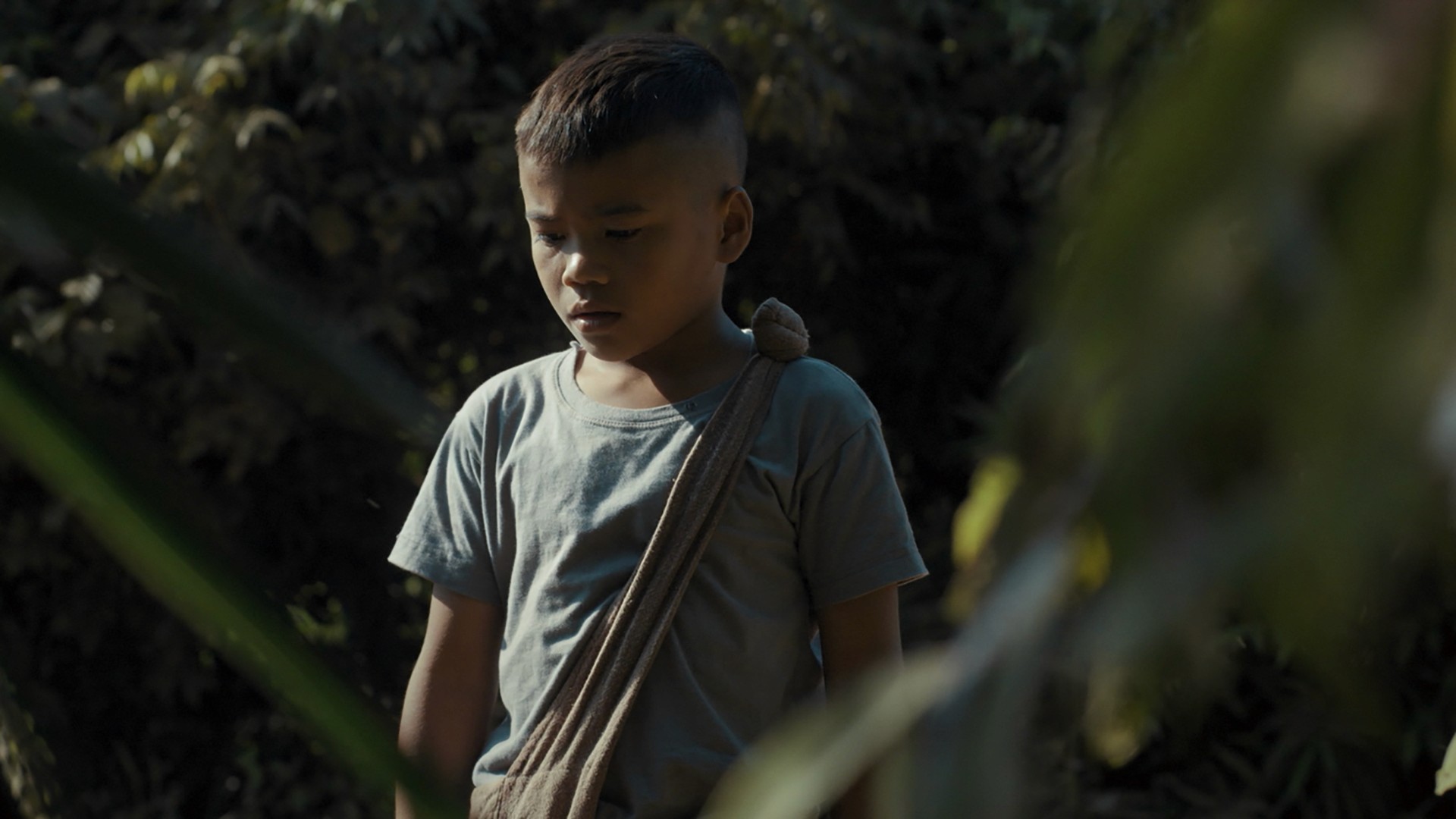
ภาพยนตร์เรื่องนี้จึงเป็นเครื่องเตือนใจที่ทรงพลัง ว่าการกระทำของเราไม่ว่าจะมีเจตนาดีต่อผู้อื่นเพียงใด แต่สุดท้ายแล้ว หากมองให้ลึกลงไป มักเกิดจากอัตตาของเราเป็นศูนย์กลางมากกว่าความต้องการช่วยเหลือผู้อื่นอย่างแท้จริง ความสงบสุขในจิตใจนั้นเกิดจากการยอมรับสภาพความเป็นจริง เรียนรู้และยอมรับตัวเองมากกว่าที่จะไปแก้ไขสิ่งที่เหนือความควบคุม — แต่แม้เราจะรู้ความจริงข้อนี้ การปล่อยวางมันทำได้กันง่ายๆจริงหรือ?
"ในเมื่อเมื่อคืนนี้ ผมยังฝันเรื่องเตรียมทำบุญให้แม่อยู่เลย แม้เขาจะจากไปสิบปีแล้วก็ตาม"
The Long Walk : A Female Gaze on Lao’s Speculative Fiction, Spirits, Attachments, and Gender Violence
"The Long Walk charmingly blends science fiction with deeply rooted Laotian spiritual beliefs, creating a film that is both haunting and thought-provoking.”

I watched The Long Walk at a time when its themes resonated deeply with my own life—when I had just lost two uncles. One from my paternal side and one from my maternal side within a day, both to cancer. In the past decade, I’ve experienced the loss of six family members, beginning with my mother. This film, with its haunting exploration of longing and letting go, offered a poignant reflection on these experiences through the lens of Theravada Buddhism.
"The Long Walk charmingly blends science fiction with deeply rooted Laotian spiritual beliefs, creating a film that is both haunting and thought-provoking.”
I watched The Long Walk at a time when its themes resonated deeply with my own life—when I had just lost two uncles. One from my paternal side and one from my maternal side within a day, both to cancer. In the past decade, I’ve experienced the loss of six family members, beginning with my mother. This film, with its haunting exploration of longing and letting go, offered a poignant reflection on these experiences through the lens of Theravada Buddhism.
“What the heck is Theravada Buddhism?”—You might ask.
It’s the oldest form of Buddhism, predominant in Southeast Asia, including Laos, Cambodia, and Thailand. It is often overshadowed by the more widely recognized Mahayana and Tantra practices in the Western world. Yet, its teachings on the impermanence of life, the nature of suffering, the cease of suffering, and the complexity of human minds and relationships are profoundly depicted in Mattie Do's narrative.
Mattie Do, a Laotian-American filmmaker, trained as a ballerina before becoming Laos's first and only female film director, known for her work in horror cinema. Born and raised in America after her family emigrated during the Laotian Civil War (1959-1975), Do's journey from ballet to filmmaking is as unique as her cinematic style. She maintains her distinctive charm and style through the emotional nuances in her films, not unlike the improvisation of a dancer during a performance. Her three films - Chanthaly(2012), Dearest Sister(2016), and The Long Walk(2019) - all feature ghosts. Do often employs speculative fiction to explore the cultural authenticity of the Lower Mekong Basin region, using horror elements to examine the lives of people in Laos.
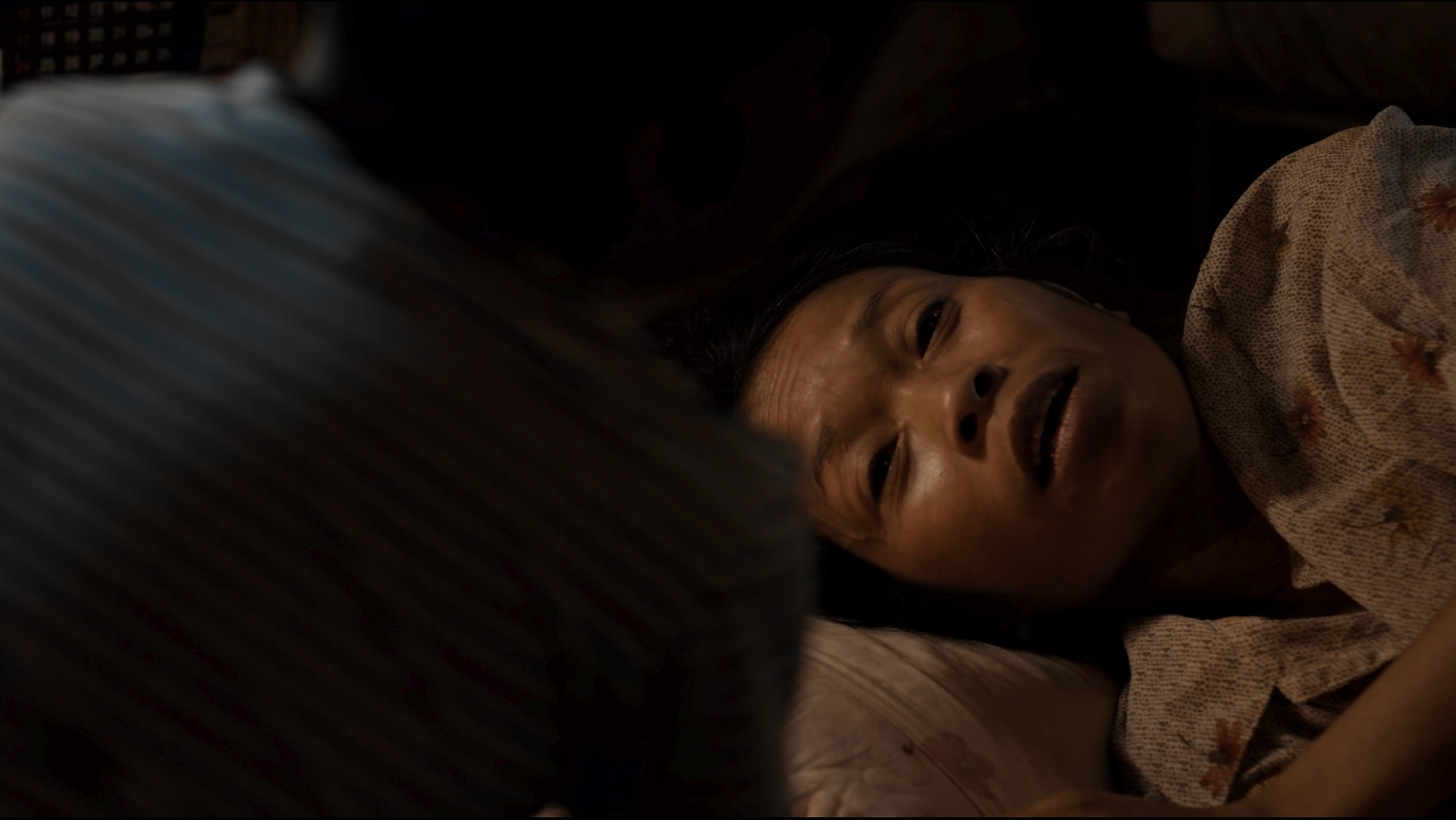
However, as the film unfolds, it becomes clear that the protagonist is not merely a well-intentioned figure. He is a serial killer, engaging in acts of mercy killing suffering women without their consent. His actions are not just about misguided compassion but are deeply rooted in toxic masculinity. The film critiques male savior complexes, showing how these can lead to further harm rather than genuine help. He believes he is helping those in need, forcefully imposing his twisted sense of compassion on others. His actions reveal a deep-seated violence inherited from his father—a loser who acted irresponsibly and failed to provide a stable and nurturing environment for his family. The protagonist's actions are also driven by a desire to change the events leading to his mother's death. This exploration of the protagonist's gendered identity adds another layer of complexity to the narrative, positioning him as both a victim and perpetrator of patriarchal violence.
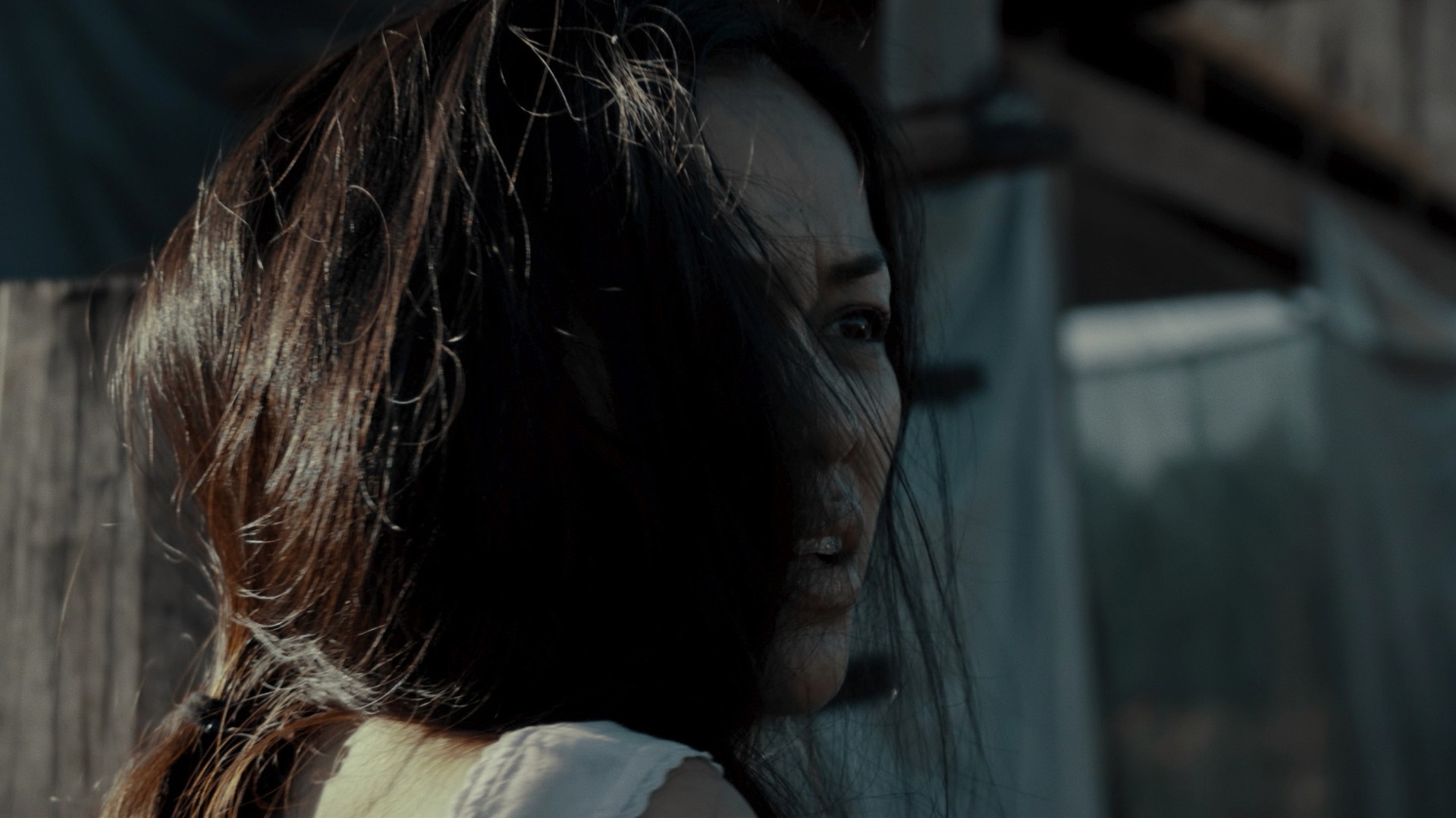
The protagonist's delusion is further highlighted by his practice of collecting the finger bones of those he has killed, which reflects his severe attachment issues. This act echoes the story of Aṅgulimāla, a figure from Buddhist scripture who collected his victims' fingers to prove his prowess. Aṅgulimāla was eventually redeemed by the Dharma of Buddha, becoming an Arahant and transcending Saṃsāra. This is a significant event in Buddhist history, often seen as a symbol of the Buddha's compassion and the possibility of transformation. However, unlike Aṅgulimāla, the protagonist in The Long Walk remains trapped in his mirage, convinced that he is leading his victims' spirits to true peace. His graveyard garden, filled with spirit houses and the remains of those he has "liberated," becomes a macabre reflection of his misbelief that he is a Messiah, not unlike a twisted version of the Western concept of utopia.
The presence of the ghostly figure in the film underscores the spiritual beliefs that have long existed in the Lower Mekong Basin—a region that includes Laos, Cambodia, Myanmar, Vietnam, and Thailand. This area is a significant part of the Indosphere, a cultural and religious territory deeply influenced by Indian civilization. However, it's important to note that the Lower Mekong Basin's religious and cultural practices are not just a product of Indian influence but also a result of a complex history of local development, trade, and exchange with other cultures, including China, other parts of Southeast Asia, and Europe. Here, cultural practices represent a unique blend of Indigenous beliefs, such as the worship of spirits, ancestors, and Theravada Buddhism, which were introduced through trade and interaction with India, later influenced by the Khmer Empire, and further developed through connections with Sri Lanka.
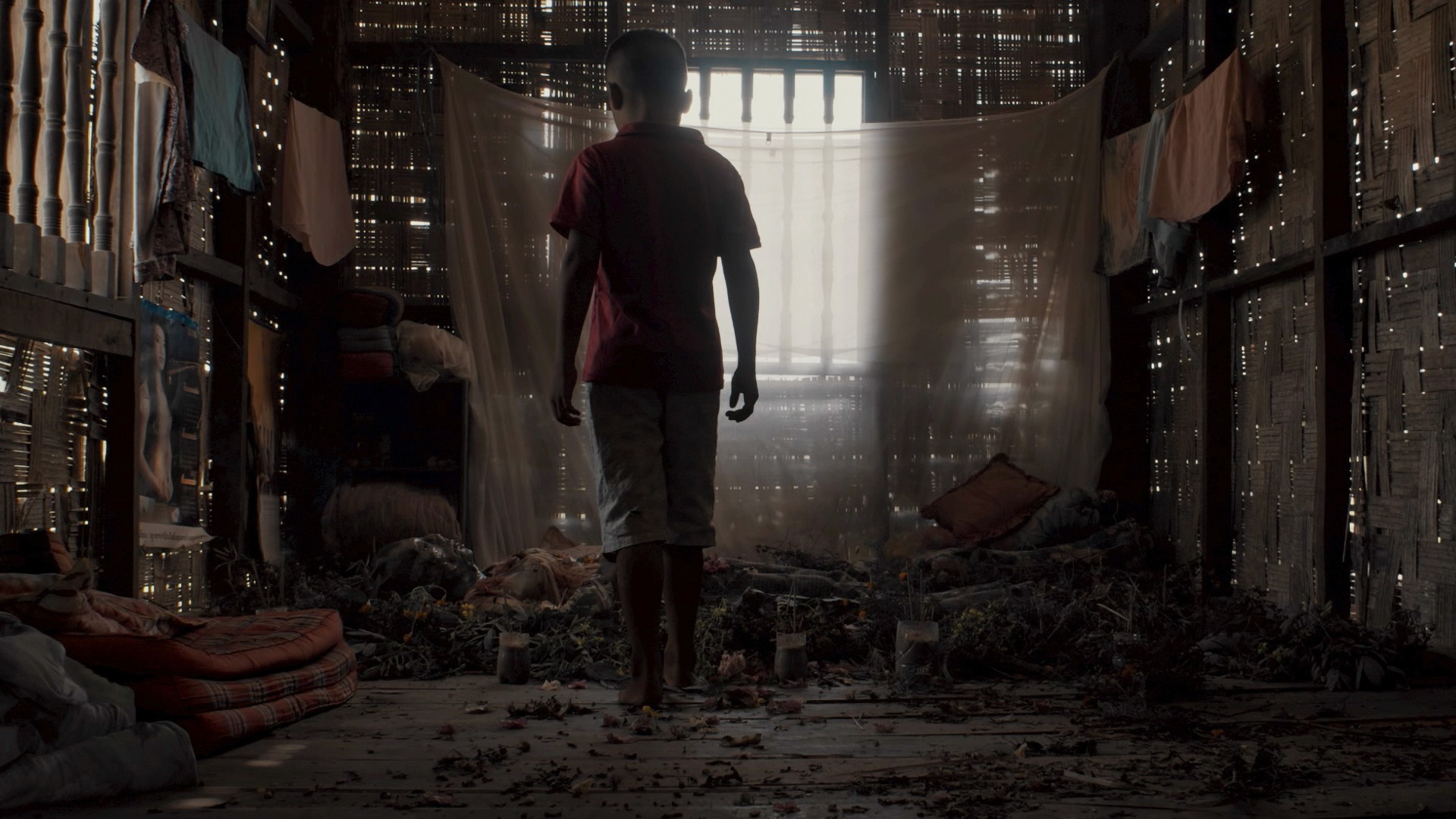
Spirit houses, small shrines embodying local animism, exemplify the fusion of indigenous beliefs with Buddhism in the Lower Mekong Basin. These structures, predating Buddhism's arrival, house and honor local spirits. Rather than replacing animistic practices, Buddhism blended with them, creating a syncretic spirituality. This integration demonstrates how the region's beliefs adapted to new religious ideas while preserving traditional elements, reflecting the complex cultural tapestry until today.
“In Theravada Buddhism, which is a significant influence in Laos, Cambodia, Myanmar, and Thailand, the concept of karma plays a central role.
Karma refers to the law of cause and effect, where one's actions in this life or previous lives determine the circumstances of future existence. The old man's journey in The Long Walk is a poignant reflection of this principle. His actions, though seemingly altruistic, are ultimately self-serving; they stem from his inability to let go of his own pain and guilt over his mother's death when he was young. The metaphorical use of time travel to explore the concept of karma and its consequences is a core tenet of Theravada Buddhism: suffering (dukkha) is an inherent part of life, and trying to manipulate outcomes with bad karma can often lead to more suffering. His desire to change the past is not truly about helping others but about alleviating his own suffering, which only leads to more complications, locking himself in a thousand loops of suffering across countless rebirths, still attached to the pain of his failed family.
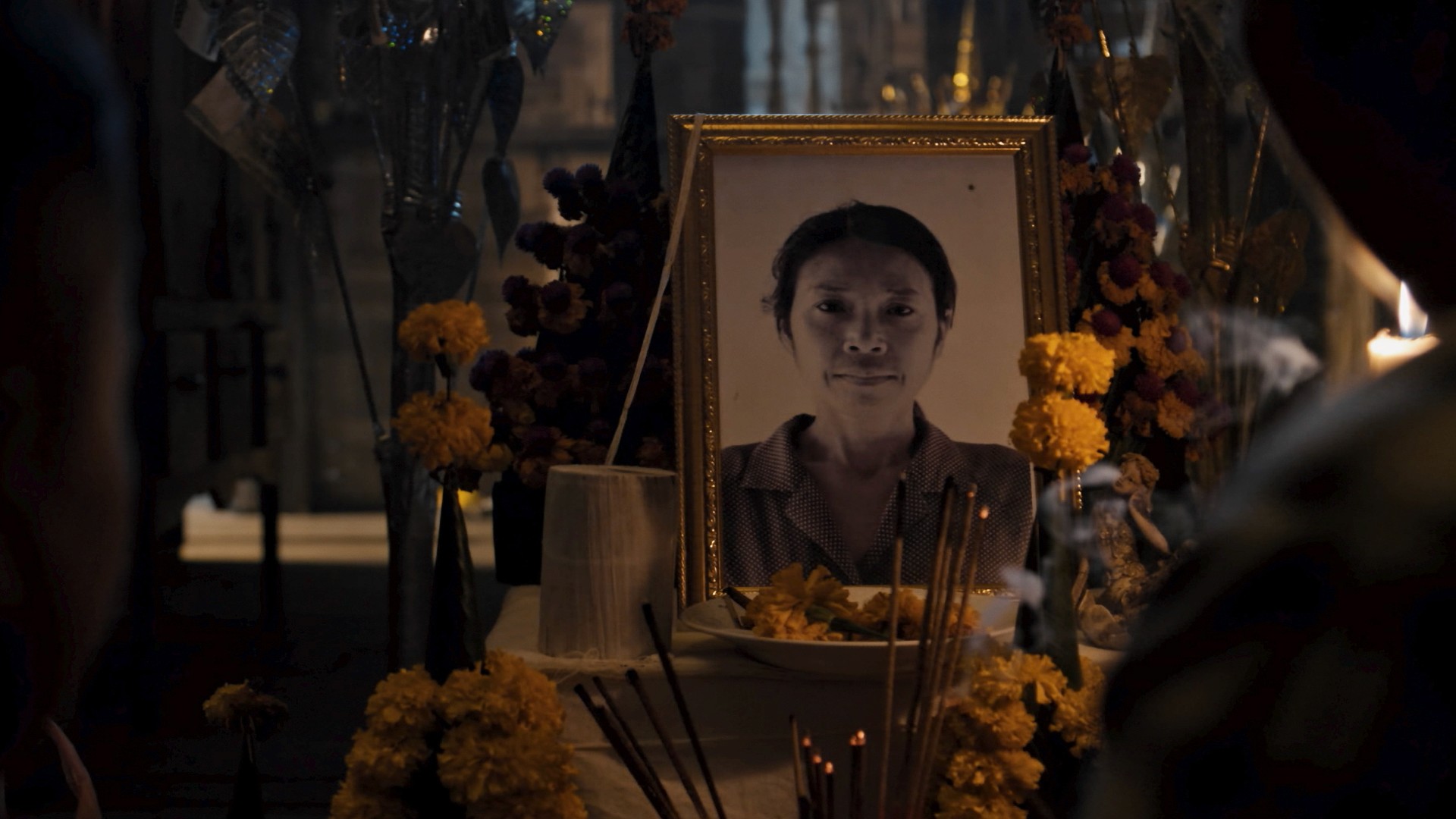
This film is not merely a ghost story but an exploration of the complexities of suffering, letting go, and the consequences of one's actions. By using ghosts as a time machine, Mattie Do's clever storytelling presents a profound work about accepting reality and the death of loved ones when it comes, while also telling us not to cling to what has already passed.
"The Long Walk thus becomes more than just a sci-fi narrative."
It is a meditation on the human condition through the lens of Laotian spirituality, Buddhist philosophy, and gender dynamics. The film's blending of genres—sci-fi, horror, and spiritual drama—allows it to explore the complexities of karma, guilt, patriarchal violence, and the cycle of life and death in a way that is both culturally specific to Laos and universally resonant for audiences worldwide.
Mattie Do's The Long Walk offers a unique cinematic experience deeply rooted in the influence of Indian civilization on Southeast Asia, as reflected through Theravada Buddhism. The film employs supernatural elements not merely for entertainment but to probe profound insights into the human psyche, the innate desire to alter the past, and the repercussions of such attempts. It also delves into family violence, revealing the deep emotional scars it leaves on the protagonist.
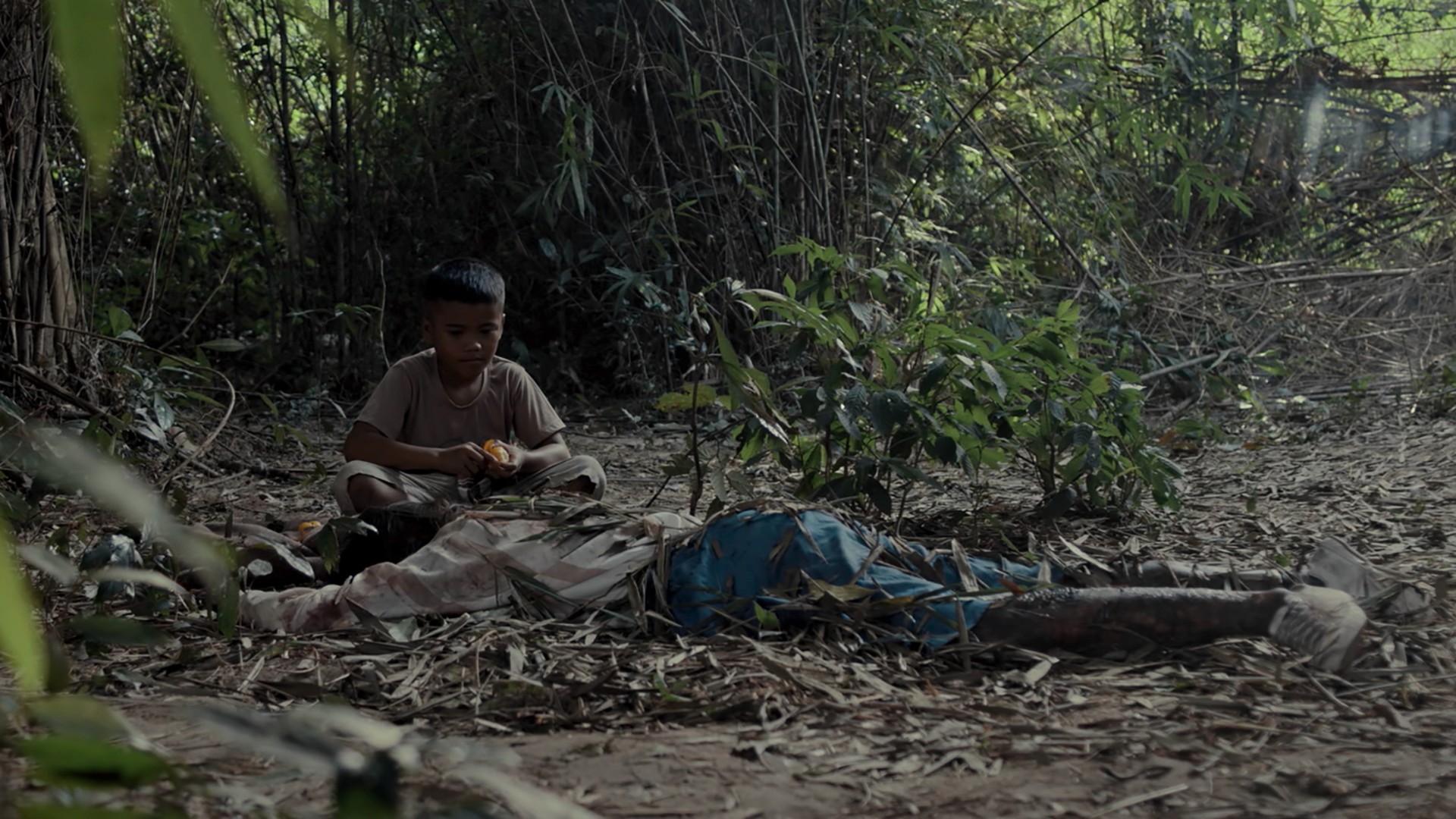
The film is a potent reminder that our actions, even well-intentioned, may often stem more from our ego and personal pain than from a genuine desire to help others. True peace of mind comes from accepting reality and understanding nature, rather than attempting to control what lies beyond our grasp. Yet, despite these lessons, it’s not easy to let go—just last night, I still dreamed of making merit for my mother, even though it’s been ten years since my beloved passed away.
This essay is the first in the “Mek◊ng Sci-Fi” series by Vorakorn “Billy” Ruetaivanichkul. It is published in English (billyvorr.com) and Thai (TheMissionTH.co) and was completed as part of the 2024 ArtsEquator Fellowship. The views expressed are solely those of the author.
"บทความชุด “Mek◊ng Sci-Fi ไซไฟลุ่มน้ำโขง” เขียนโดย บิลลี่ วรกร ฤทัยวาณิชกุล เผยแพร่เป็นภาษาไทย TheMissionTH.co และภาษาอังกฤษ billyvorr.com ภายใต้โครงการสนับสนุนของ 2024 ArtsEquator Fellowship ข้อเขียนและบทวิจารณ์ที่นำเสนอเป็นความคิดเห็นส่วนตัวของผู้เขียนทั้งสิ้น"
“บ่มีวันจาก เป็นผลงานที่มีเสน่ห์เฉพาะตัว ผสมผสานวิธีแบบนิยายวิทยาศาสตร์เข้ากับความเชื่อทางจิตวิญญาณที่ฝังรากลึกของชาวลาวได้อย่างลุ่มลึก เกิดเป็นภาพยนตร์ที่ทั้งหลอนและกระตุ้นความคิด”

"ผมได้ชมภาพยนตร์เรื่องนี้ในช่วงเวลาที่สอดคล้องกับชีวิตอย่างลึกซึ้ง เมื่อผมสูญเสียคุณลุงพร้อมกันถึงสองคน"
ทั้งสองท่านจากไปด้วยโรคมะเร็ง ในเวลาห่างกันแค่ 1 วัน จากทั้งครอบครัวฝั่งพ่อและฝั่งแม่ เมื่อมองย้อนไปในสิบปีที่ผ่านมา ผมสูญเสียสมาชิกในครอบครัวไปแล้วถึงหกคน โดยคุณแม่จากไปเป็นคนแรก เรื่องราวนี้จึงสอดคล้องอย่างน่าประหลาดกับ บ่มีวันจาก ที่พาผู้ชมสำรวจความคิดถึงคนึงหาผู้ล่วงลับและการปล่อยวางผ่านโลกทัศน์แบบพุทธเถรวาทได้อย่างเจ็บปวด
“แล้วพุทธเถรวาทคือ?”— คุณอาจมีคำถาม
พุทธเถรวาทเป็นรูปแบบดั้งเดิมที่สุดของพุทธศาสนา และยังคงมีอิทธิพลอย่างสูงในแถบเอเชียตะวันออกเฉียงใต้ โดยเฉพาะดินแดนลุ่มแม่น้ำโขงตอนล่างอย่าง ลาว กัมพูชา เมียนมาร์ และ ไทย แม้จะไม่เป็นที่รู้จักในโลกตะวันตกเท่าพุทธมหายานหรือตันตรยาน แต่หลักธรรมของพุทธเถรวาทเกี่ยวกับความไม่เที่ยง ความทุกข์ การดับทุกข์ จิตใจมนุษย์ และกรรม ถูกถ่ายทอดอย่างลึกซึ้งในภาพยนตร์เรื่องนี้โดย 'แมตตี้ โด'

'แมตตี้ โด' เป็นผู้กำกับภาพยนตร์หญิงคนแรกและคนเดียวของลาว ที่มีชื่อเสียงจากผลงานหนังสยองขวัญ เธอเกิดและเติบโตในอเมริกาหลังครอบครัวอพยพไปช่วงสงครามกลางเมืองลาวเมื่อปี 1959-1975(2502-2518) แม้เส้นทางชีวิตของเธอจะพลิกผันจากนักเต้นบัลเล่ต์สู่การเป็นผู้กำกับภาพยนตร์ แต่เธอก็ยังคงรักษาเสน่ห์และลีลาเฉพาะตัวผ่านการถ่ายทอดความละเมียดทางอารมณ์ไม่ต่างจากการ improvise ของนักเต้นระหว่างการแสดง
ภาพยนตร์ของเธอทั้งสามเรื่อง จันทะลี(2012), น้องฮัก(2016), และ บ่มีวันจาก(2019) ต่างเป็นภาพยนตร์ที่ “มีผี” ทั้งสิ้น เธอใช้ “โลกสมมุติที่มีเงื่อนไขเฉพาะ” หรือ “speculative fiction” ผสานกับแนวทางแบบสยองขวัญในการสำรวจชีวิตชาวลาว ผสานตัวตนในฐานะผู้สร้างภาพยนตร์เข้ากับความเป็นชาวลาวพลัดถิ่น เล่าเรื่องวัฒนธรรมลาวผ่านโลกแฟนตาซี กลายเป็นความเฉพาะตัวในภาพยนตร์ลาว
เธอใช้สิ่งนี้ในการสำรวจชีวิตมนุษย์อันซับซ้อน ทั้งด้านจิตวิญญาณและเพศสภาพ แสดงให้เห็นจุดตัดของประเพณี ชีวิตปัจจุบัน และอนาคตของชาวลาว ส่งผลให้ บ่มีวันจาก เป็นแรงบันดาลใจทั้งในประเทศและระดับนานาชาติ
'บ่มีวันจาก' เล่าเรื่องชายชราในหมู่บ้านห่างไกลของลาวในอนาคต เขาสามารถเดินทางข้ามผ่านเวลาได้ด้วยความช่วยเหลือของวิญญาณหญิงสาว ที่เขาพบครั้งแรกเมื่อครึ่งศตวรรษที่แล้ว ตอนเป็นเด็ก เขาเจอเธอบาดเจ็บสาหัสในป่าพร้อมมอเตอร์ไซค์ที่คว่ำอยู่ เด็กน้อยอยู่เป็นเพื่อนเธอจนลมหายใจสุดท้าย จากนั้นวิญญาณของเธอกับเขาก็กลายเป็นเพื่อนกัน เหตุการณ์นี้เป็นจุดเริ่มต้นของความผูกพันชั่วชีวิต และการเดินทางข้ามเวลาเพื่อแก้ไขอดีตของเขา

อย่างไรก็ตาม เมื่อเรื่องราวดำเนินไป สิ่งต่างๆกลับตาลปัตร ความหวังดีของเขากลายเป็นเชื้อร้าย ชายชรากลายเป็นฆาตกรต่อเนื่อง ทำการุณยฆาตให้เหล่าหญิงผู้ตรอมตรมโดยไม่ได้รับความยินยอม การกระทำนี้ไม่เพียงแสดงถึงความเมตตาที่บิดเบี้ยว แต่ยังสะท้อนรากเหง้าของความรุนแรงในเพศชาย(toxic masculinity) ภาพยนตร์วิพากษ์ปมอยากเป็นฮีโร่ของผู้ชาย ที่ต้องการเป็นผู้ปลดปล่อย(Messiah) ซึ่งมักนำไปสู่การทำร้ายมากกว่าช่วยเหลือจริงๆ
ตัวเอกเชื่อว่ากำลังช่วยเหลือผู้อื่นอย่างมีมนุษยธรรม แต่แท้จริงเขาแค่ตอบสนองปมในใจที่ต้องการแก้ไขเหตุการณ์ก่อนแม่เสียชีวิต การกระทำของเขาคือผลพวงของความรุนแรงที่สืบทอดมาจากพ่อ — ชายผู้ล้มเหลวและไร้ความสามารถในการเป็นผู้นำครอบครัวและทิ้งครอบครัวไป การบ่มเพาะจากความรุนแรงที่เกี่ยวพันกับบทบาททางเพศนี้ เพิ่มความซับซ้อนให้กับเรื่องราวอย่างมาก และทำให้เขากลายเป็นทั้งเหยื่อและผู้กระทำในเวลาเดียวกัน
อาการหลงผิดของตัวเอกถูกเน้นย้ำด้วยการสะสมกระดูกนิ้วมือของเหยื่อ สะท้อนถึงปมการ "ยึดติด" อย่างรุนแรง การกระทำนี้คล้ายกับเรื่องของ องคุลิมาล ในพระไตรปิฎก ผู้สะสมนิ้วมือของเหยื่อเพื่อยืนยันความเก่งกล้าของเขา แม้ท้ายที่สุดองคุลิมาลจะได้รับการเทศนาจากพระพุทธเจ้า จนกลับใจศึกษาพระธรรมจนบรรลุเป็นพระอรหันต์ หลุดพ้นจากสังสารวัฎ นับเป็นเหตุการณ์ครั้งสำคัญในพุทธประวัติที่มักถูกกล่าวถึงในเชิงสัญลักษณ์แห่งความเมตตาของพระพุทธเจ้าและการกลับใจของคนบาปเสมอมา อย่างไรก็ตาม ตัวเอกใน บ่มีวันจาก ยังคงยึดมั่นต่อการทำการุณยฆาตต่อไป ด้วยเชื่อมั่นว่าสิ่งที่เขากำลังทำนั้น นำพาวิญญานของเหยื่อไปสู่ความสงบที่แท้จริง ณ “สวนสุสาน” ของเขาที่ถูกสร้างไว้ราวกับเป็นยูโทเปียที่เต็มไปด้วยศาลพระภูมิและซากศพของผู้ที่ถูก “ปลดปล่อย”

การมีอยู่ของวิญญาณในภาพยนตร์เรื่องนี้ ตอกย้ำถึงความเชื่อทางจิตวิญญาณที่มีมาอย่างยาวนานในภูมิภาคลุ่มน้ำโขงตอนล่าง อันเป็นพื้นที่สำคัญที่ได้รับอิทธิพลอารยธรรมอินเดียมาแต่โบราณทั้งทางวัฒนธรรมและศาสนา อย่างไรก็ตาม ความซับซ้อนของวัฒนธรรมในภูมิภาคนี้ไม่ใช่ผลผลิตของอิทธิพลอินเดียเพียงอย่างเดียว แต่ยังเป็นผลมาจากการพัฒนาของวัฒนธรรมท้องถิ่น และความเปลี่ยนแปลงที่เข้ามาพร้อมการค้า การแลกเปลี่ยนความรู้กับวัฒนธรรมอื่นๆ รวมถึงจีน ชาติเอเชียตะวันออกเฉียงใต้ และ ยุโรป ความเชื่อทางจิตวิญญาณและขนบธรรมเนียมประเพณีของที่นี่ ผสานการบูชาผี บูชาบรรพบุรุษ กับพุทธศาสนานิกายเถรวาท ซึ่งถูกอิมพอร์ทเข้ามาผ่านการค้าและการปฏิสัมพันธ์กับอินเดีย โดยได้รับอิทธิพลจากอาณาจักรขอม และศรีลังกาตามลำดับ

"ศาลพระภูมิ" เป็นตัวอย่างของการผสมผสานระหว่างการถือผีแบบดั้งเดิมกับพุทธศาสนา ใช้เป็นที่พำนักของวิญญาณและรับการเคารพบูชา สะท้อนวิธีที่ท้องถิ่นรับแนวคิดใหม่โดยไม่ทิ้งความเชื่อเดิม ศาลพระภูมิจึงเป็นตัวอย่างที่ชัดเจนของการผสมผสานทางศาสนาอย่างมีเอกลักษณ์ในภูมิภาคนี้
ในพุทธศาสนานิกายเถรวาท ซึ่งมีอิทธิพลมากในลาว กัมพูชา เมียนมาร์ และไทย แนวคิดเรื่องกรรมมีบทบาทสำคัญ หลักของกรรมกล่าวถึงกฎแห่งเหตุและผล การกระทำในชีวิตนี้หรือชาติก่อนเป็นตัวกำหนดอนาคต
การกระทำของชายชราใน บ่มีวันจาก สะท้อนหลักการนี้อย่างลึกซึ้ง แม้ว่าเขาดูเหมือนจะมีเจตนาดี แต่ที่สุดแล้วก็เป็นไปเพื่อการตอบสนองปมในใจตัวเอง ความยึดติดเกิดจากการไม่สามารถปล่อยวางความเจ็บปวดและความรู้สึกผิดต่อการเสียชีวิตของแม่เมื่อเขายังเด็กได้
การเดินทางข้ามเวลากลายเป็นเครื่องมือสำรวจแนวคิดเรื่องกรรมและผลของการกระทำ อันเป็นแก่นของพุทธเถรวาท ที่มองว่าความทุกข์เป็นส่วนหนึ่งของชีวิต และการพยายามสร้างผลดีด้วยกรรมชั่ว มักนำไปสู่ทุกข์ที่มากขึ้น ยิ่งตัวเอกพยายามเปลี่ยนแปลงอดีตเพื่อบรรเทาทุกข์ในใจ ก็ยิ่งรบกวนความเป็นไปของกรรม นำไปสู่เหตุการณ์ที่ซับซ้อนขึ้น นี่คือสาเหตุแห่งทุกข์ที่กักขังเขาในวังวนไม่สิ้นสุด ทำให้เขาเวียนว่ายตายเกิดโดยยังยึดติดกับความทุกข์จากครอบครัวที่ล้มเหลวมานับพันภพชาติแล้ว
'บ่มีวันจาก' ไม่ใช่แค่หนังผีธรรมดา แต่เป็นการสำรวจความซับซ้อนของความทุกข์ การปล่อยวาง และผลของการกระทำ การเล่าเรื่องที่ชาญฉลาดของ แมตตี้ โด ที่ใช้ผีเป็นเครื่องย้อนเวลา นำเสนอเรื่องราวที่ลึกซึ้งเกี่ยวกับการยอมรับความเป็นจริง และการยอมรับความตายของผู้เป็นที่รักเมื่อมันเดินทางมาถึง พร้อมๆกับบอกเราว่า อย่าไปยึดติดกับสิ่งที่ผ่านไปแล้วเลย

"บ่มีวันจาก จึงเป็นมากกว่าเรื่องราวที่อยู่ในภาพยนตร์ไซไฟที่เราเคยเห็นกัน"
ผลงานนี้นำเสนอการไตร่ตรองชีวิตมนุษย์ผ่านมุมมองทางจิตวิญญาณของวัฒนธรรมลาว โดยผสมผสานแนวคิดต่างๆเข้าด้วยกัน ได้แก่ ทั้งปรัชญาพุทธศาสนา ประเด็นความรุนแรงทางเพศ และแนวหนังหลากหลาย ทั้งไซไฟ สยองขวัญ และปรัชญาชีวิต นำเสนอผ่านตัวละครที่เผชิญกับปัญหาสำคัญ เช่น ความยึดติด ความรู้สึกผิด ความรุนแรงในสังคมที่มีต้นกำเนิดจากผู้ชาย วัฏจักรของชีวิต ความตาย และ ผลกรรม ผลงานนี้สามารถสื่อสารมุมมองที่มีเอกลักษณ์ของลาวอย่างมีความเป็นสากลให้ผู้ชมทั่วโลกสามารถเข้าถึงได้
บ่มีวันจาก ของ แมตตี้ โด เป็นประสบการณ์ทางภาพยนตร์ที่ไม่เหมือนใคร สะท้อนให้เห็นถึงอิทธิพลที่มีอยู่อย่างลึกซึ้งของอารยธรรมอินเดียในภูมิภาคเอเชียอาคเนย์ที่ปรากฎผ่านพุทธศาสนานิกายเถรวาท การใช้เรื่องราวเหนือธรรมชาติไม่เพียงเพื่อสร้างความบันเทิง แต่เพื่อเสนอความคิดที่ลึกซึ้งเกี่ยวกับจิตใจมนุษย์ ความปรารถนาลึกๆในการกลับไปเปลี่ยนแปลงอดีต และผลที่ตามมาของความพยายามเหล่านั้น รวมไปถึงปัญหาความรุนแรงในครอบครัว ที่กลายเป็นบาดแผลในจิตใจของตัวละครเอก

ภาพยนตร์เรื่องนี้จึงเป็นเครื่องเตือนใจที่ทรงพลัง ว่าการกระทำของเราไม่ว่าจะมีเจตนาดีต่อผู้อื่นเพียงใด แต่สุดท้ายแล้ว หากมองให้ลึกลงไป มักเกิดจากอัตตาของเราเป็นศูนย์กลางมากกว่าความต้องการช่วยเหลือผู้อื่นอย่างแท้จริง ความสงบสุขในจิตใจนั้นเกิดจากการยอมรับสภาพความเป็นจริง เรียนรู้และยอมรับตัวเองมากกว่าที่จะไปแก้ไขสิ่งที่เหนือความควบคุม — แต่แม้เราจะรู้ความจริงข้อนี้ การปล่อยวางมันทำได้กันง่ายๆจริงหรือ?
"ในเมื่อเมื่อคืนนี้ ผมยังฝันเรื่องเตรียมทำบุญให้แม่อยู่เลย แม้เขาจะจากไปสิบปีแล้วก็ตาม"
The Long Walk : A Female Gaze on Lao’s Speculative Fiction, Spirits, Attachments, and Gender Violence
"The Long Walk charmingly blends science fiction with deeply rooted Laotian spiritual beliefs, creating a film that is both haunting and thought-provoking.”

I watched The Long Walk at a time when its themes resonated deeply with my own life—when I had just lost two uncles. One from my paternal side and one from my maternal side within a day, both to cancer. In the past decade, I’ve experienced the loss of six family members, beginning with my mother. This film, with its haunting exploration of longing and letting go, offered a poignant reflection on these experiences through the lens of Theravada Buddhism.
"The Long Walk charmingly blends science fiction with deeply rooted Laotian spiritual beliefs, creating a film that is both haunting and thought-provoking.”
I watched The Long Walk at a time when its themes resonated deeply with my own life—when I had just lost two uncles. One from my paternal side and one from my maternal side within a day, both to cancer. In the past decade, I’ve experienced the loss of six family members, beginning with my mother. This film, with its haunting exploration of longing and letting go, offered a poignant reflection on these experiences through the lens of Theravada Buddhism.
“What the heck is Theravada Buddhism?”—You might ask.
It’s the oldest form of Buddhism, predominant in Southeast Asia, including Laos, Cambodia, and Thailand. It is often overshadowed by the more widely recognized Mahayana and Tantra practices in the Western world. Yet, its teachings on the impermanence of life, the nature of suffering, the cease of suffering, and the complexity of human minds and relationships are profoundly depicted in Mattie Do's narrative.
Mattie Do, a Laotian-American filmmaker, trained as a ballerina before becoming Laos's first and only female film director, known for her work in horror cinema. Born and raised in America after her family emigrated during the Laotian Civil War (1959-1975), Do's journey from ballet to filmmaking is as unique as her cinematic style. She maintains her distinctive charm and style through the emotional nuances in her films, not unlike the improvisation of a dancer during a performance. Her three films - Chanthaly(2012), Dearest Sister(2016), and The Long Walk(2019) - all feature ghosts. Do often employs speculative fiction to explore the cultural authenticity of the Lower Mekong Basin region, using horror elements to examine the lives of people in Laos.

However, as the film unfolds, it becomes clear that the protagonist is not merely a well-intentioned figure. He is a serial killer, engaging in acts of mercy killing suffering women without their consent. His actions are not just about misguided compassion but are deeply rooted in toxic masculinity. The film critiques male savior complexes, showing how these can lead to further harm rather than genuine help. He believes he is helping those in need, forcefully imposing his twisted sense of compassion on others. His actions reveal a deep-seated violence inherited from his father—a loser who acted irresponsibly and failed to provide a stable and nurturing environment for his family. The protagonist's actions are also driven by a desire to change the events leading to his mother's death. This exploration of the protagonist's gendered identity adds another layer of complexity to the narrative, positioning him as both a victim and perpetrator of patriarchal violence.

The protagonist's delusion is further highlighted by his practice of collecting the finger bones of those he has killed, which reflects his severe attachment issues. This act echoes the story of Aṅgulimāla, a figure from Buddhist scripture who collected his victims' fingers to prove his prowess. Aṅgulimāla was eventually redeemed by the Dharma of Buddha, becoming an Arahant and transcending Saṃsāra. This is a significant event in Buddhist history, often seen as a symbol of the Buddha's compassion and the possibility of transformation. However, unlike Aṅgulimāla, the protagonist in The Long Walk remains trapped in his mirage, convinced that he is leading his victims' spirits to true peace. His graveyard garden, filled with spirit houses and the remains of those he has "liberated," becomes a macabre reflection of his misbelief that he is a Messiah, not unlike a twisted version of the Western concept of utopia.
The presence of the ghostly figure in the film underscores the spiritual beliefs that have long existed in the Lower Mekong Basin—a region that includes Laos, Cambodia, Myanmar, Vietnam, and Thailand. This area is a significant part of the Indosphere, a cultural and religious territory deeply influenced by Indian civilization. However, it's important to note that the Lower Mekong Basin's religious and cultural practices are not just a product of Indian influence but also a result of a complex history of local development, trade, and exchange with other cultures, including China, other parts of Southeast Asia, and Europe. Here, cultural practices represent a unique blend of Indigenous beliefs, such as the worship of spirits, ancestors, and Theravada Buddhism, which were introduced through trade and interaction with India, later influenced by the Khmer Empire, and further developed through connections with Sri Lanka.

Spirit houses, small shrines embodying local animism, exemplify the fusion of indigenous beliefs with Buddhism in the Lower Mekong Basin. These structures, predating Buddhism's arrival, house and honor local spirits. Rather than replacing animistic practices, Buddhism blended with them, creating a syncretic spirituality. This integration demonstrates how the region's beliefs adapted to new religious ideas while preserving traditional elements, reflecting the complex cultural tapestry until today.
“In Theravada Buddhism, which is a significant influence in Laos, Cambodia, Myanmar, and Thailand, the concept of karma plays a central role.
Karma refers to the law of cause and effect, where one's actions in this life or previous lives determine the circumstances of future existence. The old man's journey in The Long Walk is a poignant reflection of this principle. His actions, though seemingly altruistic, are ultimately self-serving; they stem from his inability to let go of his own pain and guilt over his mother's death when he was young. The metaphorical use of time travel to explore the concept of karma and its consequences is a core tenet of Theravada Buddhism: suffering (dukkha) is an inherent part of life, and trying to manipulate outcomes with bad karma can often lead to more suffering. His desire to change the past is not truly about helping others but about alleviating his own suffering, which only leads to more complications, locking himself in a thousand loops of suffering across countless rebirths, still attached to the pain of his failed family.

This film is not merely a ghost story but an exploration of the complexities of suffering, letting go, and the consequences of one's actions. By using ghosts as a time machine, Mattie Do's clever storytelling presents a profound work about accepting reality and the death of loved ones when it comes, while also telling us not to cling to what has already passed.
"The Long Walk thus becomes more than just a sci-fi narrative."
It is a meditation on the human condition through the lens of Laotian spirituality, Buddhist philosophy, and gender dynamics. The film's blending of genres—sci-fi, horror, and spiritual drama—allows it to explore the complexities of karma, guilt, patriarchal violence, and the cycle of life and death in a way that is both culturally specific to Laos and universally resonant for audiences worldwide.
Mattie Do's The Long Walk offers a unique cinematic experience deeply rooted in the influence of Indian civilization on Southeast Asia, as reflected through Theravada Buddhism. The film employs supernatural elements not merely for entertainment but to probe profound insights into the human psyche, the innate desire to alter the past, and the repercussions of such attempts. It also delves into family violence, revealing the deep emotional scars it leaves on the protagonist.

The film is a potent reminder that our actions, even well-intentioned, may often stem more from our ego and personal pain than from a genuine desire to help others. True peace of mind comes from accepting reality and understanding nature, rather than attempting to control what lies beyond our grasp. Yet, despite these lessons, it’s not easy to let go—just last night, I still dreamed of making merit for my mother, even though it’s been ten years since my beloved passed away.
This essay is the first in the “Mek◊ng Sci-Fi” series by Vorakorn “Billy” Ruetaivanichkul. It is published in English (billyvorr.com) and Thai (TheMissionTH.co) and was completed as part of the 2024 ArtsEquator Fellowship. The views expressed are solely those of the author.
"บทความชุด “Mek◊ng Sci-Fi ไซไฟลุ่มน้ำโขง” เขียนโดย บิลลี่ วรกร ฤทัยวาณิชกุล เผยแพร่เป็นภาษาไทย TheMissionTH.co และภาษาอังกฤษ billyvorr.com ภายใต้โครงการสนับสนุนของ 2024 ArtsEquator Fellowship ข้อเขียนและบทวิจารณ์ที่นำเสนอเป็นความคิดเห็นส่วนตัวของผู้เขียนทั้งสิ้น"
Text:
billyvorr
billyvorr
PHOTO:
HAL Distribution
HAL Distribution
Related Posts




